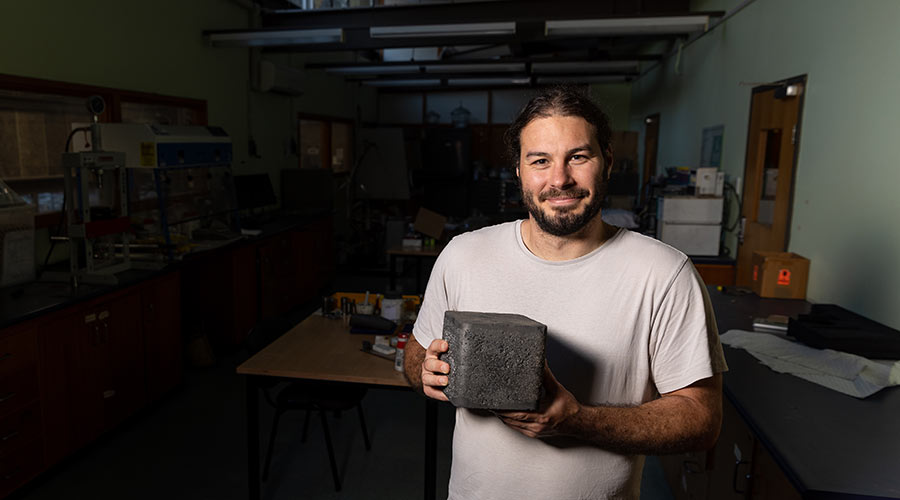Solving real-world problems through new materials
Dr Dylan Cuskelly
What a difference materials science makes. By designing and discovering new matter and making it into real products, the experts in this field are opening up new possibilities.

Dr Dylan Cuskelly is one of these material conceptualising minds. Something he and his team co-researchers balance while teaching students day to day.
Material science has been a passion of Dylan’s since childhood. He always loved making things in a laboratory and found it the most interesting part.
After being involved in a small research project as an undergraduate, he did his honours project in the field and then his PhD. These were both in mechanical engineering with a focus on the synthesis of novel materials – and completed at the University of Newcastle.
“Through my early work, I investigated advanced ceramics known as MAX phases, discovering previously unknown phases and developing new synthesis processes,” says Dylan.
“This work remains active today and has expanded into the emerging group of MAB phases where the discovery of new phases of any reaction pathways are being explored.”
The advanced materials challenge
Currently, Dylan’s main research challenge is creating new metal alloys and compounds to solve current and future problems.
“Advanced engineering applications are often limited by the materials that are available being pushed into ever more hostile conditions. We create new materials that can thrive in those conditions and applications.”
Dylan’s challenge as a researcher is not only making advanced materials but doing so in economical ways.
“Many really cool materials exist out there with amazing properties. However, they are too expensive to implement,” he says.
Sometimes this is because they involve expensive elements, and sometimes it’s because the synthesis process is just too complex.
“My work investigates the synthesis process to simplify it and attempts to make these advanced materials economic to produce.”
Energy storage tech and sustainability
While he loves to do science for the sake of science itself, the applications of his work are of great value.
One of the key areas Dylan is looking at while working in the Advanced Materials group at Newcastle, alongside Dr Heber Sugo and Prof Erich Kisi, is developing a new call of metal alloys that can be used for storing thermal energy.
Energy storage is needed to help intermittent renewable solutions, such as solar and wind take over. However, the storage and containment of that energy can present a materials problem.
“To solve it, I make new metal alloys capable of storing energy as heat to help pave the way for a renewable energy future,” says Dylan.
They called these materials MGAs, and after many years of fundamental research investigating their low-risk, high storage capacity, the materials have emerged as commercially viable energy storage media.
The technology has now been commercialised through MGA Thermal – a start-up company founded by the team.
Not only has the company made a new product for storing renewable energy that has engaged customers internationally, but the materials are also being manufactured in the local region.
This is helping to bring advanced manufacturing back to the Hunter, boosting the economy and creating sustainable and high-paying jobs.
Collaborations make it real
Despite loving the laboratory, Dylan works in a much broader context.
To help translate his research into actual impact, he’s had to build and grow various partnerships and collaborations.
“I work with everyone from other researchers to tradespeople, investors, start-ups and businesses in order to understand the whole value chain from an idea, through to research, to the creation of a material, then a product and into a reality that makes a difference to people’s lives,” says Dylan.
If you’re not finding a solution to a real problem, what’s the benefit?
To date, he’s managed to secure three grants and over $224,363 in funding. These have come from Google Australia iSTEM Zero to Hero, the University of Melbourne and MGA Thermal Pty Ltd.
From metals research to STEM education
Alongside being heavily magnetised towards materials science research, Dylan’s other passion is for education, specifically the engaging teaching of engineering and STEM concepts at a university level.
“I have developed and delivered a new engineering practical course and am perpetually working on other courses to improve the ways in which we can best deliver content to help students learn,” he says.
Together his combined interests and work are making a material difference to the future – bringing energy into research, learning and the world.
The University of Newcastle acknowledges the traditional custodians of the lands within our footprint areas: Awabakal, Darkinjung, Biripai, Worimi, Wonnarua, and Eora Nations. We also pay respect to the wisdom of our Elders past and present.
